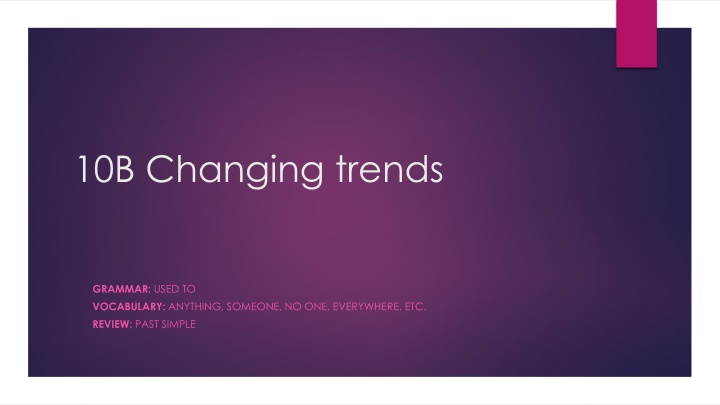
Changing Trends in Grammar: Used To and Vocabulary Review
Explore the grammar concept of "used to" for talking about past habits and states, along with vocabulary focusing on words like anything, someone, no one, everywhere, and more. Practice exercises provided for reinforcement. Enhance your English language skills with this comprehensive review.
Download Presentation

Please find below an Image/Link to download the presentation.
The content on the website is provided AS IS for your information and personal use only. It may not be sold, licensed, or shared on other websites without obtaining consent from the author. If you encounter any issues during the download, it is possible that the publisher has removed the file from their server.
You are allowed to download the files provided on this website for personal or commercial use, subject to the condition that they are used lawfully. All files are the property of their respective owners.
The content on the website is provided AS IS for your information and personal use only. It may not be sold, licensed, or shared on other websites without obtaining consent from the author.
E N D
Presentation Transcript
10B Changing trends GRAMMAR: USED TO VOCABULARY: ANYTHING, SOMEONE, NO ONE, EVERYWHERE, ETC. REVIEW: PAST SIMPLE
Changing trends Please, open your book, p. 78, and try to do execrcise 1. After that, instead of Listening, please open your book on the page 156, and read the tapescript R10.3. Now, do execrcise 2 on the page 79. Answer key: a) 4-a; 1-b; 3-c; 2-d b) 1. 1909; 2. men; 3. food; 4. clothes; 5. 40
Used to Used to 'Used to + infinitive : We use this expression to talk about habits or repeated actions in the past which we don't do in the present. We also use it to talk about states in the past which are no longer true. For example: I used to have long hair (but now I have short hair). He used to smoke (but now he doesn't smoke). They used to live in India (but now they live in Germany). Watch out! With the negative and the question it's 'use' and not 'used : Did you use to be a teacher? Did he use to study French? She didn't use to like chocolate, but she does now. I didn't use to want to have a nice house.
Use either "used to" or the Past Simple to complete each of the sentences. Use "used to" when possible. 1.I ______ (see) Marcus at the library working hard. He told me to say hello to you. 2.She ______ (be) a lot happier, but then she lost her job. 3.There ______ (be) three restaurants in this town, but two closed down leaving only one. 4.If you look over there, you can see the field where they ______ (fight) the Battle of Harris Hill in 1509. 5.Did you ______ (take) a lot of photos when you were in Moscow last year? 6.How many hours a day did you ______ (go) to school when you were ten? 7.Children never ______ (talk) so aggressively to their parents. It's terrible! 8.Soldiers ______ (build) this bridge near the end of the Second World War.
Indefinite pronouns Please, open your books, p. 79 and try to do exercise 7. After that, please read the explanation below. - We usually use someone, something and somewhere in positive sentences to mean one person/thing/place. Someone bought their clothes for them. - We usually use anyone, anything and anywhere in negative sentences and questions to mean one person/thing/place. Men didn t use to do anything like that. - We can use body or one for people: somebody = someone, anybody = anyone, nobody = no one, everybody = everyone. - No one, nothing, and nowhere mean not one person/thing/place. These words are negative and we use them with a positive verb. No one likes it. None s surprised anymore. - Everyone, everything, and everywhere have a plural meaning, but we use these words with a singular verb. Everyone is watching the breaking news.
Now, lets practice Indefinite pronouns. Could you please, do exercise 8, p. 79, Students book, and exercises 1 and 2, p. 51, Workbook. For more information on Indefinite pronouns please visit https://eslgrammar.org/indefinite-pronouns/ Thank you for your attention! #Stay safe #Stay home Lecturer Ivana Mila i ivana.milacic@udg.edu.me
